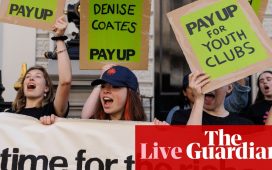FTSE 100 on track for worst week of the year
London’s stock market is sliding this morning, as investors worry that the US government could shut down tonight in a spending row.
The FTSE 100 index of blue-chip shares has dropped by 55 points, or 0.7%, to 8050 points, with banks among the big fallers.
That means the FTSE 100 has lost 3% of its value this week, the worst weekly drop since August 2023.
European stock markets are also in the red, with Germany’s DAX and France’s CAC 40 both down 1.15%.
The selloff comes as the US government teeters on the brink of a shutdown, after a budget deal backed by President-elect Trump failed to pass Congress last night.
Congress failed to pass a pared-down spending bill, after an earlier bipartisan deal was scuppered by Trump and Elon Musk.
The new bill had included the suspension on the US debt limit fro two years, which would have make it easier for Trump to pass large tax cuts and drive the US national debt even higher.
Government funding is due to expire at midnight on Friday. If Congress fails to extend that deadline, the US government will begin a partial shutdown.
Paul Donovan, chief economist at UBS Global Wealth Management,says:
Absent a deal, the US government starts to shut down tonight. A short-lived shutdown affects government workers, but has limited economic impact.
The longer a shutdown lasts, the more disruptive it is to the US economy. Economic data may not get published in a shutdown (a problem for Federal Reserve Chair Powell with their addiction to data dependency).
Key events
Closing post
Time to wrap up.
The last full trading week of the year has ended on a poor note in London. The FTSE 100 share index lost 2.6% this week, its biggest weekly loss since October 2023.
Fears of a US government shutdown weighed on European markets, along with concerns that central banks may not cut interest rates as fast as hoped.
Trade war fears also grew, after US president-elect Donald Trump warned the EU that it will face trade tariffs on its exports to the US unless its member states buy more American oil and gas.
UK borrowing in November fell to a three-year low, helped by falling debt repayment costs and higher taxes.
The data was seen as an early Christmas present for Rachel Reeves. However, economists are warning that the chancellor’s headroom is being squeezed.
UK retail sales rose by less than expected last month, suggesting consumers remained cautious.
Millions of last-minute Christmas shoppers are expected to spend £3bn over what has been called Super Weekend, with retailers eager to make up lost ground after a “shaky start” to the festive sales season.
Boohoo shareholders have rejected efforts by Sports Direct founder Mike Ashley to get himself appointed to the online fashion firm’s board.
Goodnight (and good luck getting ready for Christmas). GW
FTSE 100 posts biggest one-week fall in over a year
Despite a late mini-recovery, the UK’s FTSE 100 has indeed posted its worst weekly fall in over a year.
The index of blue-chip shares listed in London has recorded a 2.6% drop this week, the biggest one-week decline since October 2023.
Anxiety that central bankers won’t cut interest rates as fast as hoped in 2025, plus concerns that UK inflation is rising as the economy stagnates, weighed on the City this week.
Today, the FTSE 100 lost almost 21 points or 0.26% to end at 8,084 points, with other European markets also lower.
⚠️ EUROPE’S STOXX 600 DOWN 0.8%
**BRITAIN’S FTSE 100 DOWN 0.2%
**GERMANY’S DAX DOWN 0.3%
**FRANCE’S CAC 40 DOWN 0.1%; SPAIN’S IBEX UP 0.4%
**EURO STOXX INDEX DOWN 0.1%; EURO ZONE BLUE CHIPS DOWN 0.2%
— PiQ (@PiQSuite) December 20, 2024
Markets remain worried about the risk of a US government shutdown, after the House of Representatives rejected a Donald Trump-backed budget package:
Trump has posted that he wants any shutdown to happen now, while Joe Biden is president, saying:
If there is going to be a shutdown of government, let it begin now, under the Biden Administration, not after January 20th, under “TRUMP.” This is a Biden problem to solve, but if Republicans can help solve it, they will!
US consumer sentiment strengthens
US consumer sentiment has risen to its highest level since April this month, after strengthening for five months in a row.
The University of Michigan’s index of consumer sentiment has come in at 74.0 for December, up from November’s 71.8. It was lifted by a sharp increase in the measure of current economic conditions, with Republican voters more optimistic – and Democrats less so.
Surveys of Consumers Director Joanne Hsu says:
Buying conditions exhibited a particularly strong 32% improvement, primarily due to a surge in consumers expecting future price increases for large purchases. The expectations index continued the post-election re-calibration that began last month, climbing for Republicans and declining for Democrats in December.
Importantly, for Independents, expectations were essentially unchanged from the past month or so for personal finances, short-run business conditions, and long-run business conditions. Broadly speaking, consumers believe that the economy has improved considerably as inflation has slowed, but they do not feel that they are thriving; sentiment is currently about midway between the all-time low reached in June 2022 and pre-pandemic readings.
That early selloff in New York didn’t last long, though!
The S&P 500 share index is now in posiive territory, up 0.7% at 5,907 points.
Wall Street opens lower amid shutdown worries
Wall Street has opened in the red, as the risk of a US government shutdown tonight rattles traders.
The S&P 500 share index has dipped by 0.25%, or 15 points, to 5,852 points, while the Nasdaq Composite index of tech shares is down 0.6%.
Charalampos Pissouros, senior market analyst at XM, says Congress’s rejection of the spending bill backed by president-elect Donald Trump has left policymakers with no clear plan to avert a government shutdown tonight.
Pissouros adds:
If lawmakers fail to extend the deadline, the US government will begin a partial shutdown that could cut off paychecks for more than 2 million federal workers. With that in mind and should today’s PCE price data corroborate expectations of further stickiness in US inflation, investors may continue to reduce their risk exposure.
The dollar has dipped on the foreign exchange markets, as traders react to the lower-than-forecast PCE inflation readings for November.
Sterling is up half a cent today, at $1.254, suggesting that cooler-than-expected PCE is reigniting hopes of US interest rate cuts in 2025.
US PCE inflation lower than forecast in November
Just in: The Federal Reserve’s preferred measure of inflation remained unchanged last month, lower than forecast.
The core personal consumption index rose by 2.8% year-over-year in November, data from the US Commerce Department shows. That matches October’s core PCE reading, and was lower than the 2.9% which investors expected.
Headline PCE inflation came in at 2.4%, below estimates of 2.5%, but higher than October’s reading of 2.3%.
On a monthly basis, both core PCE (which excludes food and energy) and headline PCE rose by just 0.1%, below expectations of a 0.2% rise.
Credit Suisse collapse blamed on ‘years of mismanagement’

Kalyeena Makortoff
A long awaited Swiss parliamentary inquiry into Credit Suisse has concluded that the country’s regulator was ineffective in tackling scandals at the banking giant, and that years of mismanagement had put the bank in a “precarious situation” that nearly sparked a global financial crisis.
The 500-page report is the result of an 18-month investigation into the role that Swiss authorities – including FINMA and the Swiss National Bank – played in the eventual collapse of Credit Suisse, which was taken over by UBS in a forced merger during the mini banking crisis of March 2023.
Commenting on FINMA (the Financial Market Supervisory Authority), the report said its supervision:
“Its supervisory activities, while intensive – lacked sufficient impact. Despite numerous enforcement proceedings and warnings issued by FINMA, Credit Suisse continued to be plagued by a series of scandals. The PInC finds it regrettable that FINMA did not opt for a withdrawal of recognition for guarantees of proper business conduct during this period.”
However, overall, it said that the inquiry:
“Does not find any misconduct on the part of the authorities as a causative factor in the Credit Suisse crisis and acknowledges that the authorities prevented a global financial crisis in March 2023.”
Instead, it said the crisis at Credit Suisse was attributed to “years of mismanagement at the bank.”
“Responsibility for the loss of confidence in Credit Suisse and the difficulties that jeopardised its existence in March 2023 lies with its Board of Directors and Executive Board, who had defied numerous interventions by FINMA in the preceding years.”
Credit Suisse had for years been mired in scandals, but panic over its future grew in March 2023 after its largest shareholder, Saudi National Bank, ruled out any extra funding for the Swiss lender despite the growing turmoil. The crisis of confidence first forced Swiss authorities to offer emergency loans, before eventually orchestrating a shotgun takeover by Switzerland’s largest bank, UBS, which bought the lender for a cut price of 3bn Swiss francs.
The report issued a series of recommendations, including a review of emergency planning for systemically important banks in Switzerland, which failed to take into account crises of confidence and market turmoil.
UBS, which now owns the remaining Credit Suisse assets, said:
“The report confirms that the collapse of Credit Suisse was driven by years of strategic errors, mismanagement and reliance on substantial regulatory concessions….UBS supports most of the recommendations made by the Federal Council to strengthen the resilience of the financial center.
Any adjustment to the current regime must be targeted, proportionate and internationally aligned, balancing financial stability and economic impact. This is essential for a strong and competitive UBS and a Swiss financial center that supports our economy.”
British retailers have reported that sales are weakening in the run-up to the Christmas holidays.
The latest data from the Confederation of British Industry shows there has been a “moderate” fall in year-on-year sales volumes during December, and that retailers expect another fall in January.
Retailers reported that sales were “poor” for the time of year, for the seventh month in a row. Sales are set to remain below seasonal norms in January, but to a lesser extent #DTS pic.twitter.com/fgIEIxlGWf
— CBI Economics (@CBI_Economics) December 20, 2024
CBI principal economist Martin Sartorius says:
“Retailers have endured a gloomy festive period.”
“Looking ahead, retailers expect sales to fall again in January, while wholesalers and motor traders are braced for sharper sales declines.”
Retailers reported a moderate fall in annual sales volumes for December in the latest CBI Distributive Trades Survey. The decline is expected to ease slightly in January #DTS pic.twitter.com/02VjAo7Qtb
— CBI Economics (@CBI_Economics) December 20, 2024

Sarah Butler
Boohoo chair Tim Morris has told the Guardian that shareholders have given “a resounding vote of confidence in our board” at the special meeting which rejected the appointment of Sports Direct founder Mike Ashley to the struggling group’s board (see earlier post).
Morris said 99% of of those that voted – excluding the stake controlled by Ashley’s Frasers Group stake – had chosen to block Ashley’s appointment.
Morris said Boohoo would now “like to get on with running our business” – although it is not clear how Frasers will respond to the vote. Dan Finley, the new chief executive who has already helped Boohoo drive growth at its Debenhams online department store, said he was “really excited about the opportunities ahead”.
Boohoo has said Frasers, which has a 27% stake in the online specialist, could appoint an alternative to Ashley to represent its interest on Boohoo’s board. However, Morris said any candidate would have to meet certain conditions to ensure there was not a conflict of interest given Frasers’ position as a competitor.
Boohoo shareholders reject Mike Ashley

Sarah Butler
Boohoo shareholders have voted to block Sports Direct founder Mike Ashley and his associate Mike Lennon from joining its board in a blow to his efforts to wrest control of the struggling online fashion retailer.
Investors representing nearly two-thirds of Bohoo’s stock – almost 64% – voted against appointing the two men at a special meeting called by Ashley on Friday morning.
Dan Finley, the chief executive of Boohoo, said:
“Our Group is a dynamic business, with great brands and extremely talented people, underpinned by best-in-class infrastructure. Since my appointment, I have hit the ground running, taking immediate and decisive actions to maximise and unlock value for all shareholders.
“I am super energised to realise the significant opportunities I see for this business. I continue to believe this group is materially undervalued. Our most important work is ahead of us, and we will drive value for all shareholders.”
Ashley had sought to become chief executive of Boohoo but was blocked by the company from putting that proposal to shareholders.
He offered to he “work collaboratively” with the boss Finley if he won a board post and has convened a further meeting to oust Boohoo’s founder and executive vice-chair, Mahmud Kamani which is set for 21 January.
Ashley has made Boohoo the latest in a long line of targets for his corporate empire. Ashley made his fortune with Sports Direct, but has expanded via a long string of acquisitions of retailers and brands ranging from House of Fraser to Flannels and Evans Cycles under the London-listed Frasers Group.
The Boohoo chair, Tim Morris, has said Ashley and Lennon were “not appropriate candidates to join the board in any circumstances” because of “obvious conflict points”.
Earlier this month, a prominent shareholder advisory firm, Institutional Shareholder Services (ISS), urged Boohoo investors to reject Ashley’s bid for a seat at the meeting on 20 December.
However, Ashley has criticised Kamani for being an “egotistical founder who has an unhealthy grip on the board”. He also said Boohoo was “in desperate need of the guidance I can provide”.
Europe’s STOXX 600 share index is now down 2%, on track for its biggest daily drop since August.
For the last week, the Stoxx 600 has dropped by over 3.7%, which would be its biggest weekly fall since March 2023.
Bitcoin drops again
Bitcoin is falling for the third day running.
The world’s largest cryptocurrency is down over 3% today at around $94,000 this morning.
Back on Monday, it hit a record high of $108,379.
But it began sliding on Wednesday, the day when Federal Reserve chair Jerome Powell said the US central bank has no desire to be involved in any government effort to stockpile large amounts of bitcoin.
Developments in El Salvador may also have hit bitcoin. Its government reached a financing agreement with the International Monetary Fund, which has said El Salvador should limit its exposure to the cryptocurrency, this week.
But yesterday, El Salvador insisted it would keep buying bitcoin, possibly at an accelerated pace.
UK food and drink exports slide

Joanna Partridge
UK food and drink exports tumbled by 10.2% in the first nine months of the year, driven by a drop in alcohol sales, according to new data from trade body the Food and Drink Federation.
The EU remains the UK’s largest trading partner for food and drink, but exports to the bloc have fallen by 5.3% so far this year. Post-Brexit administrative burdens for shipments have been blamed for the slump in exports to the EU.
The FDF is calling for a focus on “removing unnecessary paperwork” and targeted export support particularly for small and medium sized businesses to help them clear post-Brexit trade barriers and recover lost trade.
“These figures highlight the challenges that UK food and drink continue to face when selling their products abroad,” said Balwinder Dhoot, director of industry growth and sustainability at the Food and Drink Federation.
Dhoot added:
“This is particularly true for the 12,000 SMEs in our industry, who struggle to overcome the administrative burdens of exporting. Providing more support for these businesses will help the UK strengthen its international trade and maintain its position on the global stage.”
The US is the UK’s third largest export market – with classic British tastes like cups of tea and biscuits proving especially popular – but exports to the US still fell by nearly 8% in the year to the end of September, although the UK still retains a trade surplus with the US.








